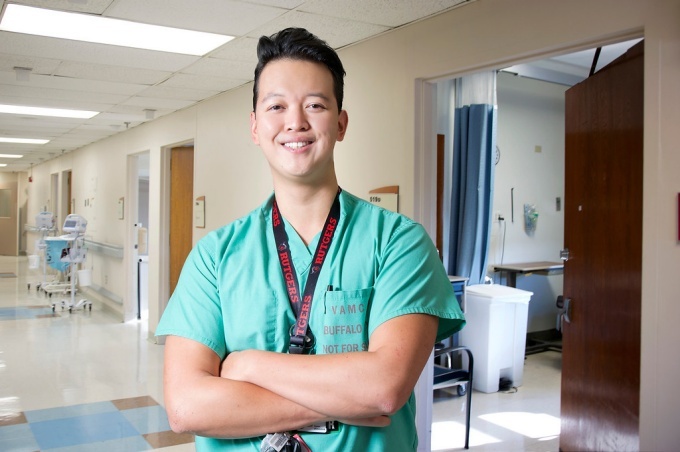PGY-5

Residents assume the role of team leaders throughout their entire fifth year. Our program has a rich tradition of training gifted clinicians and leaders like Kevin Xie, MD, who serve as role models for junior residents.
In your last year as a trainee in our program, reinforce your leadership skills when you step into the role of a more independent practitioner.
All of our fifth-year residents are chief residents for the entire year.
During your fifth year of residency, we’ll expect you to assume total responsibility for patient care and for the management of the urology service. These heightened duties will expand your professionalism and knowledge of systems-based practice, and they will fine-tune your communication and interpersonal skills.
Further, our fifth-year curriculum enables you to feel secure in:
- providing humanistic patient care
- assessing the relevant literature
- using information technology
The unique and diverse patient populations you’ll care for during your final year of rotations will equip you with a comprehensive educational experience; you’ll feel prepared to proceed to fellowship training or to clinical community-based practice.
Surgical Experience
As a chief resident, you will be the primary surgeon on operative cases. Of course, our supportive faculty members are always there to supervise you.
By the end of your fifth year, you will have advanced knowledge about:
- pre-operative and post-operative care of patients with complex urologic operations
- early recognition and treatment of complications of urologic surgery
- laparoscopic, open surgical and endoscopic procedures
- ureteroscopy, nephroscopy, hand-assisted laparoscopy, female urology and the use of lasers in urology
Robotic surgery
Solidify your understanding of robotic surgery during your final year of training. We’ll expose you to robotic-assisted procedures at Buffalo General Medical Center, Millard Fillmore Suburban Hospital and the Buffalo VA Medical Center.
During your robotic surgery training, you will have the opportunity to sharpen your knowledge of procedures including:
- radical and simple prostatectomy
- partial and total nephrectomy
- nephroureterectomy
- partial cystectomy
- radical cystoprostatectomy
- pyeloplasty
- ureteral reconstruction
- ureteroneocystostomy
- partial and total adrenalectomy
As a senior resident, you will spend the majority of your time at the surgeon console — the area where you can control the robotic instruments.
Through a minimum of 80 cases by your fifth year, you’ll acquire the skills you need to be an adept console surgeon.
Rotations
| Location | Duration |
|---|---|
| Buffalo General Medical Center | 4 months |
| Buffalo VA Medical Center | 4 months |
| Millard Fillmore Suburban Hospital | 4 months |
Didactics
Throughout the year, you’ll be required to present at most of our conferences. We’ll also hold you responsible for resident education at our weekly Wieder’s Club Conference.
Teaching Experience
As a chief resident, you’ll assume the role of a team leader throughout the entire length of your training.
You’ll finalize your teaching experience by mentoring junior residents. You will work with first- and second-year trainees during rotations, which will refine your valuable peer-teaching skills and develop your communication and administrative skills.
You’ll find that supervising and instructing your fellow trainees also contributes to resident camaraderie and rapport.
You’ll also instruct medical students during their rotations at Buffalo General Medical Center, Millard Fillmore Suburban Hospital and the Buffalo VA Medical Center.